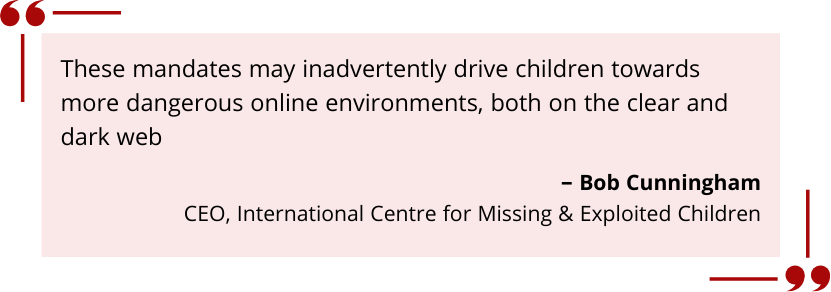Free Speech Coalition v. Paxton
Supreme Court Case Preview
Question Presented
Are government restrictions on adults’ access to constitutionally-protected sexual speech subject to strict scrutiny?First Amendment Concerns
These laws impose significant barriers to adults’ access to lawful content and effectively function as government censorship.Privacy and Data Security
Current age verification methods risk exposing sensitive personal data to breaches and misuse. Mandatory verification exposes users to increased risk, while also leading to increased state and corporate surveillance.Effectiveness and Implementation
The various patchwork of state laws’ effectiveness is questionable as users can circumvent restrictions utilizing virtual private networks (VPNs), access adult content on search or social media sites, visit non-compliant sites outside the US, or resort to the dark web.
Key Issues
Case Background
In 2021, states began passing laws requiring websites containing more than 33.3% material “harmful to minors” to force users to upload government ID and/or submit to background checks, facial scans, and other invasive procedures in order to access content.
Major platforms like Pornhub are essentially forced to block access in these states to avoid putting users’ sensitive data at risk.
Free Speech Coalition’s Argument
Preventing children from accessing adult content is important. Requiring every adult website to force its users to share their sensitive personal information to gain access is an ineffective, unsafe, and unconstitutional way to approach it.
Case History
US District Court Judge David Ezra enjoined a Texas bill (HB 1181) with age verification provisions nearly identical to federal laws previously struck down by the Supreme Court. Judge Ezra, a Reagan appointee, explained that online age-verification places a profound chill on adults’ access because “individuals know the information is at risk,” “data breaches have become more high-profile, and data related to users’ sexual activity is more likely to be targeted.” Relying on decades of Supreme Court precedent, Judge Ezra held that the law’s age-verification provisions are likely unconstitutional.
The Fifth Circuit Court of Appeals vacated the injunction on the grounds that the Supreme Court had effectively made a mistake in its 2004 ruling striking down a similar law.
The Supreme Court has agreed to hear Free Speech Coalition’s appeal in its October Term 2024.
Implications
A ruling in favor of Texas would be a tectonic shift in First Amendment jurisprudence. The government will be empowered to create content-based restrictions on Americans’ speech that extend far beyond sexually explicit media.
Free Speech Coalition is represented by the American Civil Liberties Union and the law firms of Quinn Emanuel Urquhart & Sullivan and Webb Daniel Friedlander LLP.
What They’re Saying
The Free Speech Coalition is the 501(c)(6) advocacy organization dedicated to defending the right to create and enjoy sexual expression in the United States.






